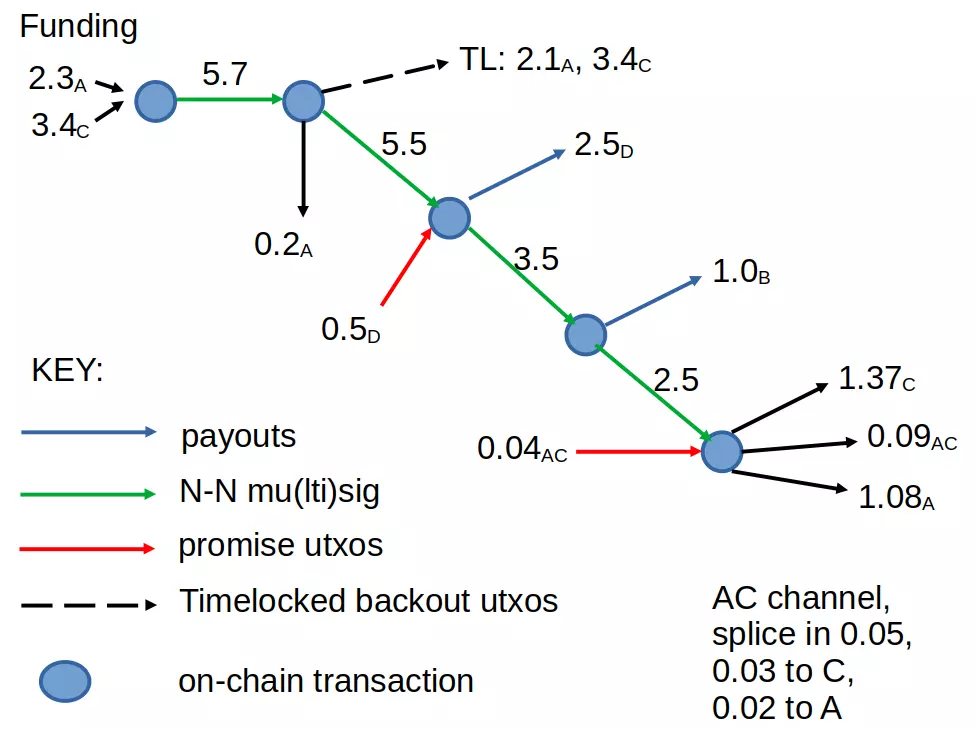waxwing on Nostr: Imagine that the ownership of a utxo could be traded directly - ignore, for a moment, ...
Imagine that the ownership of a utxo could be traded directly - ignore, for a moment, that you can't trade ownership with private keys, ignore trading costs etc. etc., not because those issues don't exist, but because I want to focus on the economic calculus outside of it.
Now this question is only interesting if the utxo is somehow encumbered, and ignoring general covenants, let's focus specifically on timelocked utxos (which is in fact a primitive covenant).
So concretely, imagine 1 BTC which is timelocked for 1 year, and imagine you could somehow freely trade it. What would its market value be?
Note that this is *not* similar to traditional put/call options, because we are not talking about the *option* to buy something, but about directly trading it. So it seems to be the same contract as a future (except not requiring a court to enforce!). You're buying the thing (in this case "a" bitcoin), but not able to do anything with it until 1 year expires. Is that worth more or less than 1BTC today?
In normal futures markets, there is another factor to consider: the base currency in which the "commodity" is being priced. So nobody talks about the price of a futures contract on a barrel of oil, measured in barrels of oil, they only talk about it measured in USD. For that case, we have "normal" curves where the further out into the future you go, the more it costs to buy such a contract, because you are hedging risk of volatility and you pay a premium for that, and then you have inverted or "backwardated" curves where it's actually cheaper to buy well into the future, because of competing factors like storage costs and others.
We could try to apply that logic to trading bitcoin/usd futures and indeed, they exist! So people do exactly that. But I'm thinking of the price of the contract in BTC. It seems obvious that the price of 1 BTC in 1 year is less than 1BTC today, because the buyer forgoes the *option* to use the money in the meantime, for anything else, including productive investment. That discount is sometimes called the "time value of money". So you could imagine some formula like 1 BTC - r*1year*1BTC where r is some vague idea of a riskless interest rate.
That's all very kind of "standard" thinking but I am not sure if it's the real story. If I buy a futures contract I have to literally hand over the money to a broker and I receive a contract. But if I somehow gain ownership of a timelocked utxo (see caveat at the start), I have something slightly different. Can if I borrow against it and gain independent value from it while it is locked? I thought about this but the picture appears to be very muddy. So, can I? What do you think? :)
Now this question is only interesting if the utxo is somehow encumbered, and ignoring general covenants, let's focus specifically on timelocked utxos (which is in fact a primitive covenant).
So concretely, imagine 1 BTC which is timelocked for 1 year, and imagine you could somehow freely trade it. What would its market value be?
Note that this is *not* similar to traditional put/call options, because we are not talking about the *option* to buy something, but about directly trading it. So it seems to be the same contract as a future (except not requiring a court to enforce!). You're buying the thing (in this case "a" bitcoin), but not able to do anything with it until 1 year expires. Is that worth more or less than 1BTC today?
In normal futures markets, there is another factor to consider: the base currency in which the "commodity" is being priced. So nobody talks about the price of a futures contract on a barrel of oil, measured in barrels of oil, they only talk about it measured in USD. For that case, we have "normal" curves where the further out into the future you go, the more it costs to buy such a contract, because you are hedging risk of volatility and you pay a premium for that, and then you have inverted or "backwardated" curves where it's actually cheaper to buy well into the future, because of competing factors like storage costs and others.
We could try to apply that logic to trading bitcoin/usd futures and indeed, they exist! So people do exactly that. But I'm thinking of the price of the contract in BTC. It seems obvious that the price of 1 BTC in 1 year is less than 1BTC today, because the buyer forgoes the *option* to use the money in the meantime, for anything else, including productive investment. That discount is sometimes called the "time value of money". So you could imagine some formula like 1 BTC - r*1year*1BTC where r is some vague idea of a riskless interest rate.
That's all very kind of "standard" thinking but I am not sure if it's the real story. If I buy a futures contract I have to literally hand over the money to a broker and I receive a contract. But if I somehow gain ownership of a timelocked utxo (see caveat at the start), I have something slightly different. Can if I borrow against it and gain independent value from it while it is locked? I thought about this but the picture appears to be very muddy. So, can I? What do you think? :)
